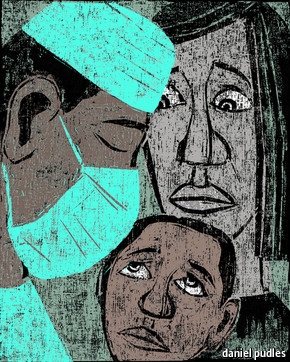
JANE AUSTEN was wrong. It is not weddings that make the best fiction, but funerals. Taiye Selasi’s first novel opens with the unexpected death of her hero, Kweku Sai. A brilliant medical student from Ghana who becomes an exceptional surgeon in Boston, as a young man Dr Sai was well on his way to fulfilling the American dream. He graduated top of his class from Johns Hopkins, earning the admiration of all his peers.
簡奧斯汀錯(cuò)了。造就一部優(yōu)秀小說的是葬禮,而不是婚禮。Taiye Selasi的處女作以男主角Kweku Sai的離奇死亡作為開場。Kweku Sai,一名來自加納的優(yōu)秀醫(yī)學(xué)院學(xué)生逐漸成為波士頓出色的外科醫(yī)生。作為個(gè)年輕人,Sai醫(yī)生的美國夢走地一帆風(fēng)順。他畢業(yè)于約翰霍普金斯大學(xué),拔尖的成績讓他贏得了所有同輩們的欽佩。
It takes but a moment, though, for dreams to turn into a nightmare. Called by the president of the hospital, Dr Sai operates against his better judgment on 77-year-old Jane “Ginny” Cabot, a Boston “socialite, wife, mother, grandmother and alcoholic” with a ruptured appendix. She never comes round; a weary surgical nurse marks the time of death as 3am. The Cabots, donors to the hospital, waited too long to call an ambulance. They want to blame someone; the brilliant African surgeon has to be “l(fā)et go”.
但不久之后,美夢成噩夢。迫于醫(yī)院院長的要求,Sai醫(yī)生只能違背自己對病情的準(zhǔn)確判斷,給一位闌尾破裂的77歲婦女做手術(shù),這個(gè)病人名叫Jane Cabot,是意大利裔波士頓人,她有多重身份,是社交名流,人妻,人母,祖母,還是個(gè)酒鬼。但術(shù)后她未能醒來。筋疲力盡的外科護(hù)士寫下死亡時(shí)間,凌晨3點(diǎn)。Cabot的家人,醫(yī)院的贊助者,因?yàn)榈却茸o(hù)車耽誤了搶救時(shí)間,他們認(rèn)為必須有人為此承擔(dān)責(zé)任,所以年輕有為的非洲外科醫(yī)生必須“走人”。
Unable to face telling his family, Dr Sai dresses each morning in his surgical scrubs and pretends to go to work. Only when his 14-year-old son witnesses him being thrown out of the hospital does he finally crumble. In the dead of night he abandons his family, leaving Fola, his magnificent Nigerian wife, to raise their four children alone. How each of them faces up to this ordeal is the story of “Ghana Must Go”.
無顏面對妻子孩子的Sai每天穿上工作服假裝去上班。當(dāng)他14歲的兒子目睹他被趕出醫(yī)院時(shí),他徹底崩潰了。那晚他拋棄了自己的家庭選擇自殺,留下妻子,偉大的Fola,獨(dú)自撫養(yǎng)四個(gè)孩子。他們怎樣面對殘酷的現(xiàn)實(shí)成為Ghana Must Go的故事中心。
The book takes its title both from a 1983 campaign to evict 2m Ghanaian refugees from Nigeria and the must-have shopping bag that middle-class Ghanaian women use to bring back shopping from abroad. “Ghana Must Go” comes with a bagload of prepublication praise. For once, the brouhaha is well deserved. Ms Selasi has an eye for the perfect detail: a baby’s toenails “l(fā)ike dewdrops”, a woman sleeps “l(fā)ike a cocoyam. A thing without senses…unplugged from the world.” As a writer she has a keen sense of the baggage of childhood pain and an unforgettable voice on the page. Miss out on “Ghana Must Go” and you will miss one of the best new novels of the season.
書的名字源于兩件事。一件是1983事件,尼日利亞當(dāng)局驅(qū)逐了200萬加納難民;另一件是must-have購物袋,加納的中產(chǎn)階級婦女用它在國外購物。還未出版,Ghana Must Go就獲得了一致好評。這些褒獎(jiǎng)實(shí)至名歸。Selasi十分注重細(xì)節(jié):嬰兒的腳趾甲“就像露珠”,熟睡的女人“像個(gè)芋頭,無法感知,被拔出這個(gè)世界。”顯然,作為一個(gè)作家,她對童年痛楚所造成的精神創(chuàng)傷,無法遺忘的心聲都有著敏銳的洞察力。錯(cuò)過Ghana Must Go,你也就錯(cuò)過了年度最佳小說之一。














